
Facial recognition technology has rapidly evolved over the past decade, presenting both opportunities and challenges for society. As the capabilities of this technology expand, it is crucial to examine its ethical implications and ensure responsible use. This blog post aims to explore the ethical considerations surrounding facial recognition technology and provide valuable insights for readers.
The Rise of Facial Recognition Technology
Facial recognition technology is a process of identifying or verifying an individual’s identity using their facial features. It has found applications in various fields such as law enforcement, security, marketing, and personal device authentication. The technology utilizes deep learning algorithms and machine learning techniques to analyze facial patterns and match them against existing databases.
The Benefits of Facial Recognition Technology
Proponents of facial recognition technology argue that it offers numerous benefits, including enhanced security and crime prevention. Law enforcement agencies use it to identify criminals from surveillance footage, assisting in investigations and ensuring public safety. It also enables quick and convenient personal device authentication, reducing the need for passwords or PINs.
Additionally, facial recognition technology has been employed in various industries, such as retail and marketing. It can help businesses analyze customer behavior, optimize product placement, and personalize marketing campaigns. These advantages contribute to improved customer experiences and higher operational efficiency.
Ethical Concerns and Considerations
However, the expanding use of facial recognition technology has raised significant ethical concerns. One of the primary concerns is the potential infringement on individuals’ privacy rights. The technology relies on collecting and storing biometric data, raising fears of unauthorized access and misuse. Unauthorized surveillance and tracking capabilities could compromise personal privacy and civil liberties.
Another ethical concern is the potential for bias and discrimination in facial recognition algorithms. Several studies have highlighted the propensity for these algorithms to be less accurate when identifying individuals from certain racial or ethnic backgrounds. These accuracy disparities can result in unfair targeting and incorrect identifications, perpetuating existing biases and exacerbating social inequalities.
Moreover, facial recognition technology’s use in law enforcement has raised questions about its potential for misuse and abuse. Critics argue that it could lead to unchecked surveillance, targeted profiling, and violation of due process rights. Concerns have been expressed regarding the lack of clear legal frameworks and regulations governing its use, leading to potential abuse of power.
Ensuring Ethical Use of Facial Recognition Technology
To address these ethical concerns, it is imperative to establish robust guidelines and regulations for the development and deployment of facial recognition technology. Transparent governance frameworks should be established to ensure accountability and safeguard individual privacy. This includes requiring explicit consent and providing clear information on how facial data will be used, stored, and shared.
Moreover, continuous auditing and testing of facial recognition algorithms should be conducted to identify and rectify biases and inaccuracies. Diverse datasets should be used during training to avoid implicit biases. Collaboration between technology developers, policymakers, and civil rights organizations can foster dialogue and ensure the technology’s responsible and fair implementation.
It is also essential to empower individuals to have control over their biometric data. Mechanisms for individuals to easily opt-out or withdraw consent for the use of their facial data should be in place. Implementing robust data security measures, such as encryption and secure storage, is crucial to prevent unauthorized access and data breaches.
Conclusion
Facial recognition technology has the potential to revolutionize various aspects of our lives. However, its ethical implications cannot be overlooked. Addressing privacy concerns, mitigating biases, and ensuring transparency and accountability are vital steps towards the ethical use of facial recognition technology.
As society continues to grapple with striking the right balance between technological advancements and individual rights, it is critical to engage in thoughtful conversations surrounding facial recognition technology. By upholding ethical standards, embracing transparency, and respecting privacy, we can harness the benefits of this technology while minimizing its potential pitfalls.
References:
- Smith, A., & Authur, N. A. (2021). Facial Recognition Technology: Ethical and Societal Implications. Journal of Digital Forensics, Security, and Law, 16(2), 239-252.
- Crawford, K., & Schultz, J. (2019). The limits of crisis data: analytical and ethical challenges of using social and mobile data to understand disasters. GeoJournal, 84(4), 835-852.
- Raji, I. D., & Buolamwini, J. (2019). Actionable Auditing: Investigating the Impact of Publicly Naming Biased Performance Results of Commercial AI Products. Proceedings of the 2019 Conference on Fairness, Accountability, and Transparency, 67-76.






